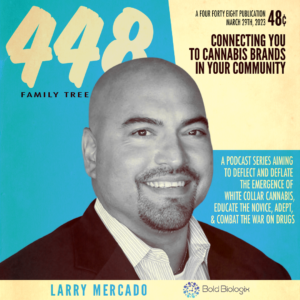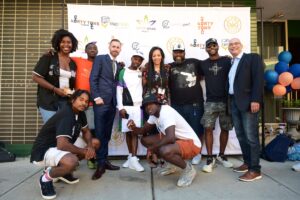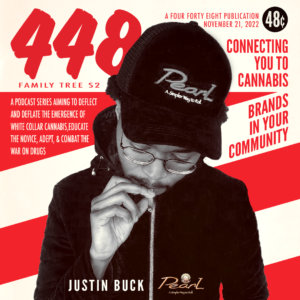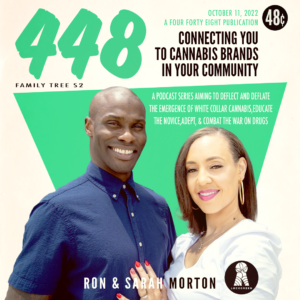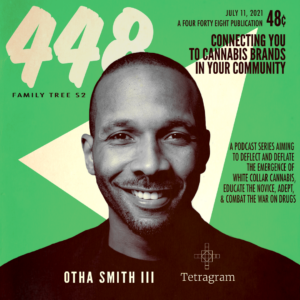Family Tree: 40 Villages
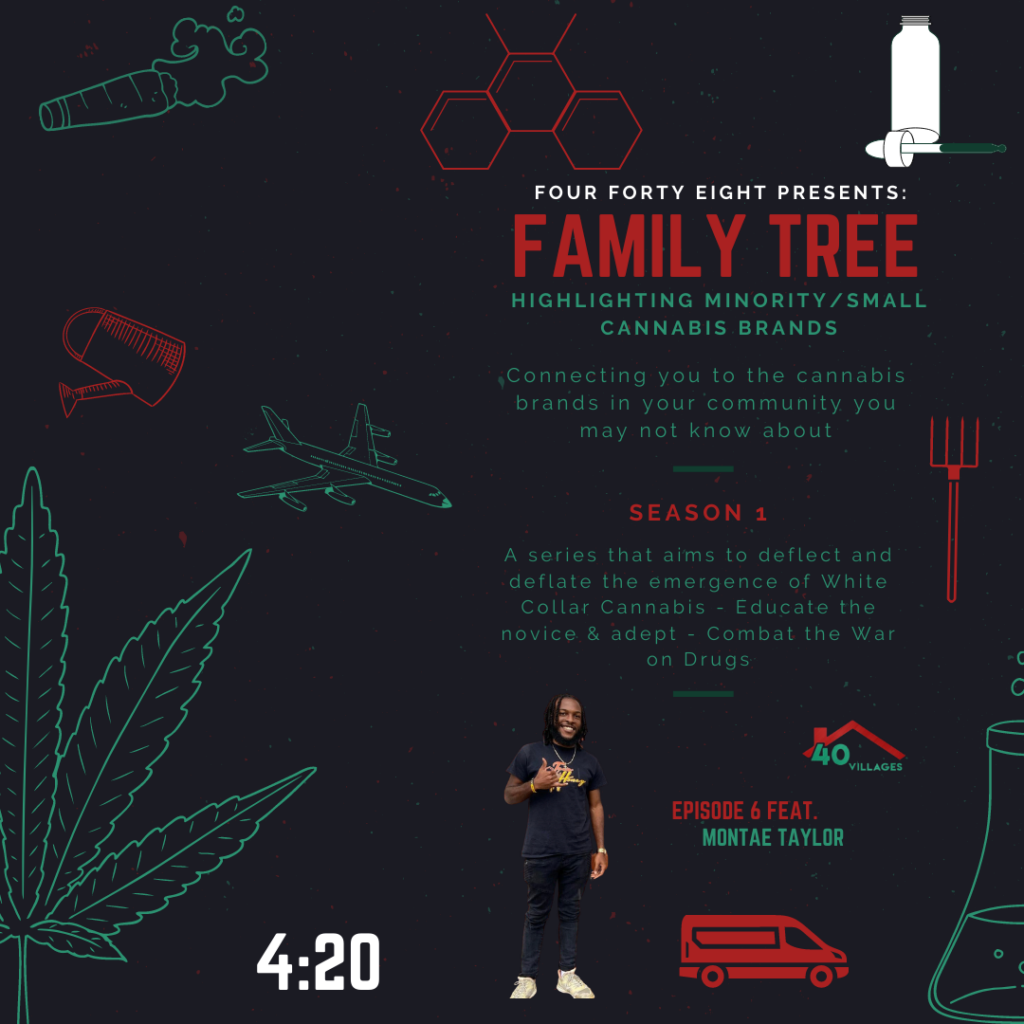

Co-Founder, CEO Montae Taylor
It’s often stated, “It takes a village to raise a child”. Raising children takes a collective effort, so we’d say that saying rings true. After the Emancipation Proclamation was signed in 1863, some 158 years ago, it commenced the abolition of slavery. Some slaves were tantalized with the idea of reparations in the form of land (Not to exceed 40 acres), a mule to borrow. For the community by the community and everyone lending a hand and doing their part. Those are two of the principles 40 Villages are entrenched with. Approaching cultivation with a community focus might be just what the industry needs. With aspirations of modeling themselves as a black version of the Better Business Bureau, CEO Montae Taylor looks to set the standard for years to come. Enriched with community focus and solidarity, 40 Villages looks to bring a new take on cultivation.
Q: Walk us through 40 villages. How’d you guys come about and what’s the mission of the company?
A: 40 Villages is an idea I thought about my freshman year in college. I wanted to connect black people with black businesses. Genuine people with genuine businesses. Bringing reparations to the community. By community supporting the community, we build our own reparations without having to ask anyone else for them. The name didn’t come about until my senior year in college. I was talking to my roommate one day, who is now my COO, Ashton Roberson. I was talking to him and we just kept trying to figure out what the name should be. We were trying to force it. We came to the conclusion that it couldn’t be forced. We had to let it come organically. Reflecting on the importance of what we were doing, paying attention to minority-owned brands, and bringing those institutions together. Not only to help ourselves out monetarily but to fix the things that are wrong by working together. By using each other as a leg, 1000 legs are better than 2. With that being said, we said to ourselves it just sounds like reparations for the people. When the children see these businesses and institutions working together they’ll realize the limit goes beyond the sky. They can, and will own empires. From there we were like “Yea, it really takes a village to raise a child” right when I said that, I was like YO! 40 Acres & a Mule x It Takes a Village to Raise a Child. 40 Villages..
Q: In understanding the many hats 40 Villages wears, what brought you to the world of Hemp Farming? Was this your first business venture?
A: No. I actually got my hand into agriculture when I was about 5 years old. My brother started a lawn care company in which he still supports his family off of now. Called Lil Kelvin’s Lawn Service. As early as 8, I was using the push mower. I was holding it above my head. I had the leaf blower, which I had to lean over to use. Not because of it being too heavy but it might’ve blown me away when I pressed the trigger. I was a country boy at heart although I grew up in the city of Richmond. My dad’s family was from a rural area. So that’s how we got into lawn care and eventually agriculture. By me realizing first of all, how fun it was being an entrepreneur, and then being in charge of my own situation was very eye-opening. Because I was seeing my parents go to work every day. After that, we were helping in the community, and I knew that was something I wanted to do, I just didn’t know the capacity. I took a love for bees. I just conquered my fear and stopped being scared of them. Long story short, since I was the one no longer scared of bees I started to study bees a lot more. I realized people were making a lot of money off of honey and it wasn’t that hard to produce. Well, it is but it’s not something you’re going to have to put a lot of money into the actual labor of it. I also realized bees are so important for our agriculture. Yet they’re dying at a fast rate. I studied more and more and then got into beekeeping. Which put me in contact with a lot of farmers. All while trying to connect the black community with black businesses. Eventually, after meeting so many different types of farmers I found out there was a black conglomerate with their own farmers market. Coupled with finding out hemp was becoming legal on the CBD side as well as industrial.
Q: Do you personally use Hemp-based products (clothes etc)?
A: Personally, the main thing I’ve started using is hemp soap. Dr. Bronner’s hemp soap. You can use it on EVERYTHING. I clean my hair with it, I clean my toilet with it. You can literally use it for everything. I’ve even washed my dog with it. It was really the first hemp product I’ve used. I say it was my first because my mom said she used it on me as a child and I didn’t even realize it. I bought little hemp products like bags that were made. Then, actually for the bees. We have to smoke our bees sometimes. You put a hemp bag inside the smoker which is pretty much like rope. You put it into this can and light it up. Once it catches on fire, you close it and it has a nozzle where the smoke comes out when you squeeze the back. And it’s hemp smoke. I’m not going to say we’re getting the bees high or anything, but that’s environmentally what’s preferred when we go into the hive. And they’re chill, more so curious than anything. Now we pretty much use it for everything. We make hemp lotion. My loc gel is hemp. When we have any aches or pains or just aren’t feeling good we use it. Sometimes I rub our CBD infused honey on my knee and use it just like Neosporin. So yea, I’m all over the place with it.
Q: How did you accrue your knowledge of the benefits of Hemp/Cannabis? Would you say it was through traditional learnings such as books or more of a personal trial and error basis?
A: I would say both, haha. I experimented with it in high school like most kids. I didn’t know what I was doing then. But then I had a moment when I got to college I was like “I can’t deal with this anymore” I felt like I was abusing it. That was my freshman year, then I started to do more research on it. Not just why it’s illegal but what it is in general. I got two degrees while in college both in criminology and sociology. And I was pre-law, so I went back and forth between the legalities of hemp to the physical aspect of how it breaks down into your brain. In my psychology class, we actually talked about the endocannabinoid system that all humans have in their bodies. It’s pretty much like you have a system in your body that needs water along with anything else that helps it function. This is the natural part of your system that needs to be fed, treated with vitamins, and everything else. My professor told us that “people who have migraines, take cannabis sometimes. It Interacts with the Endocannabinoid system and they get healed.” That caught me off guard, I was like “Wait a minute!” I started staying after class asking about the Endocannabinoid system. So from then, I started doing research. I started doing a lot of research. That’s how I got exposed to CBD & CBG which help with my migraines. Experimentation and trial and error. From a standpoint of, I don’t know everything.
Q: Are you currently farming for self-marketing (40 villages hemp clothes etc.) or as a third-party source for other Hemp-based companies?
A: As of right now, we’re definitely deep into the farming stage. We have an outdoor operation going on right now. When that’s over we’ll be working on our indoor ops. We’re also working on connecting the farmers with the community as I said before. Connecting black and brown businesses to the black and brown communities. Right now, we’re laying our infrastructure out completely. We have 2 store spots we’re getting into as well.
Q: What are your thoughts on the future of Black-owned cannabis companies in this predominantly white American industry in the United States?
A: I’d like to start off by saying this first. I’m a game big kind of person. So I never see things as negative. With that being said…White people are on it!! When it comes to this cannabis industry. They are the ones ahead of the game when it comes to knowing everything that’s coming out, the laws, having all the credentials, the funding, and the clientele. So…What I hear from that is, Let’s get it! Alright, bet. We’re up against the wall. It’s 10-2, we got like 1Q left in the game and the point guard is just warming up. They just took the point guard off the bench, cause they lettin’ him out of prison. He’s off the bench, we’re getting these records expunged..Let’s go. Let’s get it. That’s how I feel bro. And with COVID happening, all these protests and people are getting serious with what our intentions are and how we spend our money…We’re just warming up! And these black businesses are not letting up. As more people are seeing, “Oh, I’m making bread, dealing with my own people?” Let’s go! We’re still stuck in the house, we’re still out of our daily norm. So people are losing their jobs left and right. Their gonna need to find something consistently to get into. And one market that’s never gonna die is the cannabis industry. So with this thing being legalized now, I see that growing black business tremendously. Now we have more and more lawyers, just young black educated individuals in general who have the tools and the connections to get things done for us. Yeah bro, I feel like we’re just getting started. Like I said I feel like it’s the last quarter of the game and y’all know you finna dog them real quick. And you’re just getting hype.
Q: Where do you see 40V in say, 5 years? 40 villages in 5 years?
A: Man! First of all, we’ll have an app developed. I’m talking black Amazon status. We’re putting everybody and their momma on. The warehouses we put in your area will have a daycare. And we’ll employ the elderly women in the community to work there. 40 villages in the next five years, will be international. We’re working on it as we speak. It’ll be limitless. We want to create a bond system for the people with who we start to get involved. We’re already planning for the next 5 years, from entertainment to screenplays, sports, whatever you want to put into the mix. We want to make sure our logo is on anything black. Have you heard of the Better Business Bureau? 40 Villages looks to be the black version of the BBB for our community.
Q: What do you think the pros and cons would be in switching to hemp-based clothing vs Cotton based?
A: Honestly I don’t see any cons. I don’t. For one hemp uses half the amount of water to grow as cotton. You also can’t use the stalk of cotton in the production of clothes. But you can use the hemp stalk to make clothes. That’s more sustainable. But what you have to look at is, who owns the cotton fields! Let’s be real with ourselves for a second. I know none of my uncles nor either of y’all’s owned a cotton field. If so, he bought it off somebody. Going from there, this is a way for us to get into the market. On top of that, if you look at the price of clothing right now. We have this fantasy about, if it feels good it’s supposed to be expensive. If it’s of good quality it’s supposed to be expensive. The thing is, you can make a good quality if it’s good quality materials you’re making it with and it can still be very affordable. When you do that, now you think about our children. Who are the main ones who go to school with shirts that look like belly shirts which they’ve had for the last 3 years cause their parents can’t afford to buy more shirts. Now we can make more affordable clothes for these kids. So it’s a lot more that comes into play with that.
Q: In your opinion what is the importance of sticking together and band together to help advance the industry?
A: Forty Villages bro! Forty villages. What I’m doing, is really the answer to that question. In my eyes. I get that all the time. I was heavily in the civil rights movement for a long time so I was always getting asked the question. So I said we need a hub. We need to make institutions that are beneficial to our community readily accessible at all times. Because assessability is the main problem when you look at what is going on in our communities. So with that being said, with recently graduated college students. I realize when I was a recent grad white kids who had one degree in biology, where they might not have learned fully were getting more opportunities than me, and I had two degrees on top of being pre-law while maintaining a 3.2 on time. I realize my accessibility had to be on point. So what I’m doing with 40 villages is connecting those recent grads to CEOs of black-owned companies in the industry and fields they’re looking to work in. I actually have an intern already. He’s 13 years old and I am teaching him how to run a business early. He started from the grassroots. He’s with me when I do everything, he handles my emails and all of that. On top of that, it’s the accessibility of being able to get things there. We’re investigating warehouses. It’s all about partnerships. We don’t want to OWN anything.
“Connecting to the prison and post-prison community is another side of it. With that, we look to employ that community if they’re in the need of a job. We’re making sure our warehouses and every facility we operate business out of is a resource for those in need”
-Montae Taylor

